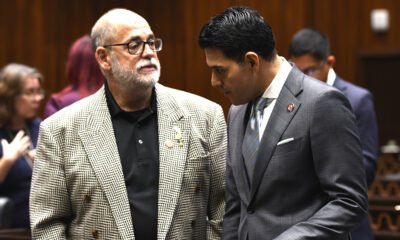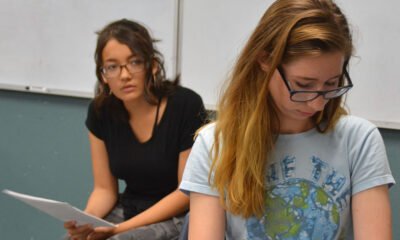Aliento
Private Scholarships Empower Arizona’s Dreamers Amid Financial Challenges

Since the passage of Proposition 308 in 2022, students without citizenship status in Arizona, including DACA recipients, can pay in-state tuition rates provided they have graduated from an Arizona high school. However, these students face significant challenges when it comes to financial aid. Federal funding through the Free Application for Federal Student Aid (FAFSA) and Pell Grants is unavailable for non-citizens. Meanwhile, the Arizona Promise Scholarship, which helps cover tuition for in-state students, requires FAFSA or Pell Grant eligibility, leaving many without options.
As state and federal aid remains scarce, local organizations are stepping in to provide financial support, often supplemented with mental health resources for students navigating the complex realities of their immigration status. José Patiño, vice president of education and external affairs for Aliento, a nonprofit advocating for undocumented and mixed-status families, reflects on his own experience with these barriers when he planned to attend Arizona State University in 2006.
Patiño received an offer of in-state tuition and a full scholarship, but the passage of Proposition 300 that same year, restricting aid for students without proof of citizenship or lawful status, left him unable to attend college. Together with Reyna Montoya, founder of Aliento, they both became beneficiaries of the American Dream Fund, which supports undocumented students. Their organization continues to provide similar opportunities today.
Recently, Aliento concluded applications for the Adelante Scholarship, a partnership with the Helios Education Foundation and Education Forward, offering up to $5,000 annually for bachelor’s degree candidates and $2,500 for those pursuing an associate’s degree.
“We’re talking about students, dreamers, who came here at a very young age,” Montoya stated. “Most of their parents are undocumented and lack formal employment. Providing access to scholarships based on merit or economic need is crucial.”
Patiño notes a growing necessity to broaden support options due to increasing anxiety surrounding legal status and educational pursuits. The fear of family detentions or deportations disrupts the educational journeys of many students, causing them to reconsider their college aspirations.
“It is just a constant barrage,” Patiño remarked, highlighting the new realities faced by these students which have reshaped Aliento’s operations to rely more on community word-of-mouth than on public outreach.
Moving forward, Montoya envisions the expansion of the Arizona Promise Program to encompass all residents. “Investing in education is critical,” she asserted. “I represent what that investment can yield—opportunities that enable young people to give back to their communities.”
Rich Nickel, president and CEO of Education Forward, emphasizes the importance of upholding Proposition 308 and securing ongoing support for these initiatives. He pointed to the organization’s Achieve60AZ plan, which aims for a 60% higher education attainment rate in Arizona, potentially bringing $5 billion in economic benefits to the state.
“The only way to achieve this is to ensure everyone in Arizona has opportunities,” Nickel concluded. “Since passing Prop. 308, we’ve worked to include students who have lived here their whole lives and aspire for a better future.”


















